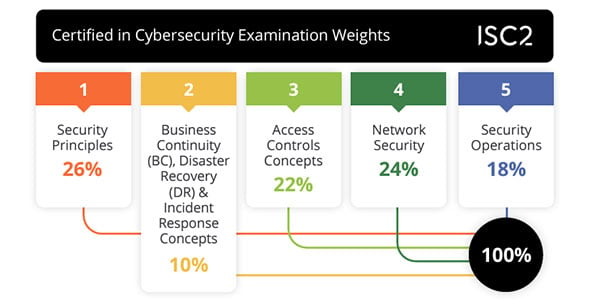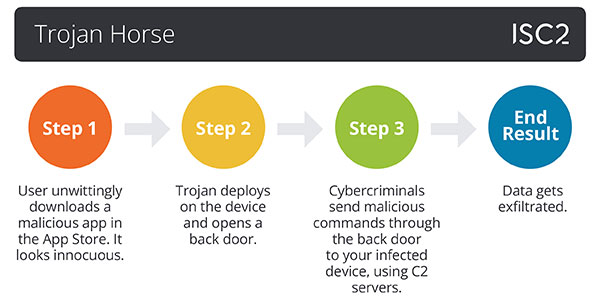If you’re gearing up for your Certified in Cybersecurity (CC) exam, your study strategy will undoubtedly be top of mind. Staying motivated and ensuring your study habits produce results can be daunting, but it doesn’t have to be. Let’s look at some practical, yet not plainly obvious, techniques and strategies that may help you to make the most of your study plan.
Commit to a Timeline
First things first: register for your exam. Setting a date creates a clear timeline, giving you a goal to work toward. Without a concrete date, it’s easy to relegate studying for your exam to the back burner, particularly when life gets busy. Once you’ve locked in your exam date, it’s time to create a study plan.
Work backward from your exam date. Break down your study sessions into manageable chunks, depending on your schedule and amount of free time. Aim for at least 15-30 minutes a day and a couple hours over the weekend. But avoid cramming more than five hours into one weekend; it’s better to spread out your learning to help retain information.
Keep up with your study routine, even during weeks when your schedule is lighter or on days when you don’t feel like studying. Building and maintaining a study routine is crucial to ensure consistent study habits. It helps you stay on top of your game and avoid last-minute cramming. Use your time to get ahead or delve deeper into tougher topics.
Practice Active Learning Techniques
Simply reading and rereading your notes isn’t always the best way to study. To actively engage with the content, try some of these proven techniques:
Create Study Guides by Topic

One practical approach to preparing for the CC exam is to create comprehensive study guides for each topic. This involves formulating questions and problems based on the material and writing out complete answers. By creating your own questions, you actively engage with the material, which is infinitely more effective than passive reading alone. It forces you to think critically about your learning and identify key concepts.
Writing out complete answers also helps reinforce the material in your memory. Remembering facts is important, but so is understanding them well enough to explain them clearly and succinctly. Also, by formulating questions, you’re prompted to look at the material from different angles. This broader perspective can deepen your understanding and prepare you for the variety of questions that may pop up on the exam.
For example, if you’re studying network security, you might ask, “What are the primary differences between a firewall and an intrusion detection system?” In response, write a detailed answer that covers both the technical specifications and practical applications of each.
Teach the Material
Teaching the exam material to others is another powerful study technique. Explaining concepts to someone completely new to the topic is a great test of how well you know the material. This process requires you to organize your thoughts clearly and logically so that others can grasp the concepts you are presenting.
The more you practice explaining concepts, the more likely you are to remember them during the test. Teaching helps transfer information from short-term to long-term memory. For example, if you try to explain the principles of encryption and decryption and you find yourself stumbling over any part of your explanation, revisit your notes and study that section again.
Joining the CC Study Group and teaching other learners can also solidify your understanding of the material. What’s more, helping your peers and giving them an extra boost of confidence before the exam can be a personally rewarding experience!
Use Concept Maps and Diagrams
Many of us find it easier to understand and remember information when it’s presented visually. Visual aids like concept maps and diagrams can help you break down complex information into more digestible pieces. These tools help you see the connections between different concepts.
Diagrams can simplify abstract ideas, making them more concrete. This is particularly useful for visualizing network architectures or understanding data flow in a security protocol. For example, a diagram can help you understand how different types of network threats operate.

Study Real-World Examples
Relating study material to real-world scenarios can dramatically deepen your understanding of how theoretical concepts apply in practical settings. This is especially important in cybersecurity, where practical application is key.
Real-world examples also serve as memory aids since you’re more likely to remember a concept when you can associate it with a real-life scenario or experience. These examples also provide context, making abstract ideas more relatable and easier to grasp.
For instance, when studying incident response, think about a real cyberattack that made the news. How did the company respond? What could they have done better? Analyzing answers to these questions can demonstrate how the principles you’re studying would apply to that situation.
Practice Problem-Solving for Technical Topics
In technical fields like cybersecurity, problem-solving is essential. It helps you apply what you’ve learned in a practical context. Detailing each step and its rationale reinforces your understanding of the process and ensures you grasp both the “how” and “why.”
The CC exam will test your ability to apply knowledge, not just recall facts. Practicing problem-solving prepares you for this type of questioning. For example, to practice configuring a firewall, write down each step you take and explain why it’s necessary. What are the potential pitfalls? How do you troubleshoot issues?
Leverage Multimodal Learning
Combining different learning modes, such as seeing, hearing and writing, can enhance retention. Consider using text-to-speech apps or audiobooks alongside reading. Apps like NaturalReader or Amazon Polly can transform your notes into audio format, helping you engage with the material differently.
Flashcards never go out of style! Writing them by hand is a powerful tool, as writing helps reinforce memory. Categorize your cards into stacks based on how well you know the content; this will help you spend more time on your areas of weakness. Or, if you prefer, test your knowledge and receive immediate feedback with Official ISC2 Certified in Cybersecurity Flash Cards.
Rely on ISC2 Resources
Studying with others who share your certification goals can help, too. Join the ISC2 Study Group on the ISC2 Community or your local ISC2 Chapter to find study partners. Collaborative learning enables the exchange of ideas and provides support, making the preparation process less isolating.
ISC2 has a wealth of resources tailored to help you with CC exam prep. If you’re a One Million Certified in Cybersecurity candidate (and if you’re not, we suggest you sign up), you’ll get free access to our CC Online Self-Paced Training and exam. Our Official CC eTextbook can help you review the topics covered in the official ISC2 training and gain greater clarity on key cybersecurity concepts. You can also use the CC Study Pack and the CC Exam Ready Booklet to familiarize yourself with the exam structure and content.
Remember, the goal is to build a solid understanding of the concepts in the exam outline, so you understand how to apply them to real-world applications.
Self-testing is another powerful tool. Create quizzes for yourself or use practice tests available through ISC2 resources. This will help prepare you for the exam format and identify areas that need more attention.
Finally, don’t forget to take breaks. You need time to process and absorb information. Short, regular reprieves can prevent burnout and keep your study sessions productive.
It’s a Marathon, Not a Sprint
Preparing for the CC exam is a process. By committing to a timeline, using active learning techniques, leveraging ISC2 resources and implementing effective study hacks, you’ll be well on your way to mastering your exam study strategy. Remember, building a comprehensive understanding of cybersecurity principles will serve you well beyond the exam. Happy studying and good luck!
